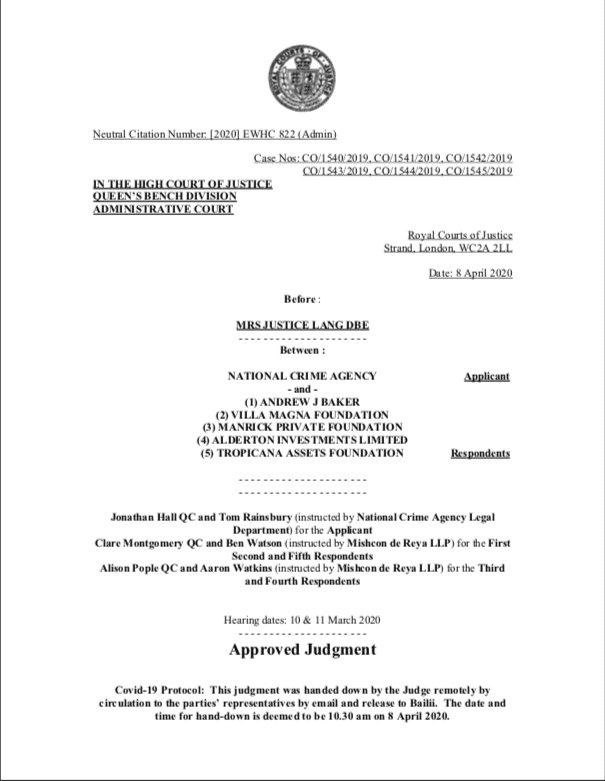What is an Unexplained Wealth Order?
The power was introduced by section 1 of the Criminal Finances Act 2017 (“CFA”) which created a new section 362A of the Proceeds of Crime Act 2002 (“POCA”).
A UWO requires that the respondent explains how they acquired property. If the respondent does not provide adequate evidence the property is deemed by the relevant authority to be “recoverable property” for the purposes of a civil recovery (s.362C).
What are the facts of this case?
The NCA brought three UWO against properties which they believed to have been purchased with the embezzled funds by Rakhat Aliyev. Rakhat Aliyev had been accused of crimes including murder and a plethora of financial crimes before his death in prison.
The details of the properties can be seen below:
- A high security mansion at 33 The Bishops Avenue in Hampstead – one of the most expensive roads in Britain known as “Billionaires’ Row”. The 10-bedroom home has an underground pool, “tropical showers”, a glass domed roof, a dedicated cinema and separate quarters for staff
- A mega apartment in a luxury secure development at 21 Manresa Road, Chelsea, constructed following a multi-million pound merger of two already enormous flats
- Another secure mansion at 32 Denewood Road, Highgate, a private cul-de-sac with views over one of London’s most exclusive golf clubs
What did the NCA have to prove?
Contrary to the standard used in a criminal trial where the relevant authority must decide whether the evidence is strong enough that a jury would find beyond reasonable doubt that there had been a criminal act, in order to successfully apply for a UWO one of the above authorities must only meet the civil standard of proof.
Civil recovery proceedings under POCA only require the relevant authority to prove to the High Court that on the balance of probabilities there has been a criminal act.
The High Court must also be satisfied that there is reasonable cause to believe that:
- the respondent hold the property;
- the value of the property is greater than £50,000;
- there are reasonable grounds for suspecting that the known sources of the respondent’s lawfully obtained income would have been insufficient for the purposes of enabling the respondent to obtain the property;
- the respondent is a politically exposed person or there are reasonable grounds to suspect they have been or are involved with serious crime or a person connected to serious crime
Additionally, the respondent can hold the property in part or in its entirety alone or with any other persons. It is irrelevant whether the property was obtained before or after the legislation permitting the UWOs came into force, namely the CFA.
Why was this case successful?
It was ruled by Mrs Justice Lang at the High Court that simply because property is held in a complex and opaque manner, which many properties are in London, should not give rise to suspicion that the underlying funds used to purchase them are proceeds of crime.
In this case it was not sufficient for the NCA to show that the respondent’s known lawful income was insufficient to have purchased the property. This evidence must refelct the actual interest the respondent has in the property.
This decision may be impactful as it may limit the effectiveness of UWO’s against trustees, who usually do not have an interest of real value in the property.
The judgment can be read below:
Not based in London? We provide nationwide representation
That does not matter, we will represent you no matter where you are based in England or Wales.
If you contact us through our contact form, by email or by phone, one of our debt recovery team members will contact you by phone to discuss your matter and assess whether we can help you.
If we can, we will arrange a conference with a senior member of our debt recovery team. This meeting will take place either in person or using our telephone conference facilities or via Skype if you prefer. Therefore, no matter where you are based in England or Wales we can represent you.
Unexplained Wealth Order Defence Lawyers
The legislation in respect of the above have become a field of great importance in recent years. The consequences of falling foul of a UWO can be very serious and devastating for individuals and corporations. Therefore considered, timely and accurate expert advice is essential.
Our Defence and Private Prosecution team advises both corporate clients and individuals on all legal issues concerning offences created by way of the Proceeds of Crime Act 2002.
We regularly deal with complex, large and difficult confiscation proceedings in the criminal courts under the Proceeds of Crime Act and the previous statutory regimes.
We are experienced in asset tracing, restraint orders, the appointment of Receivers under the Proceeds of Crime Act, third party rights and directors’ disqualification proceedings. We are also happy to appear for interested parties in receivership proceedings and have particular expertise in forfeiture/cash/property seizure hearings. We are frequently instructed in defendant High Court restraint work and have in depth experience of lifting restraint or receivership orders from assets of defendants or third parties to criminal proceedings.

